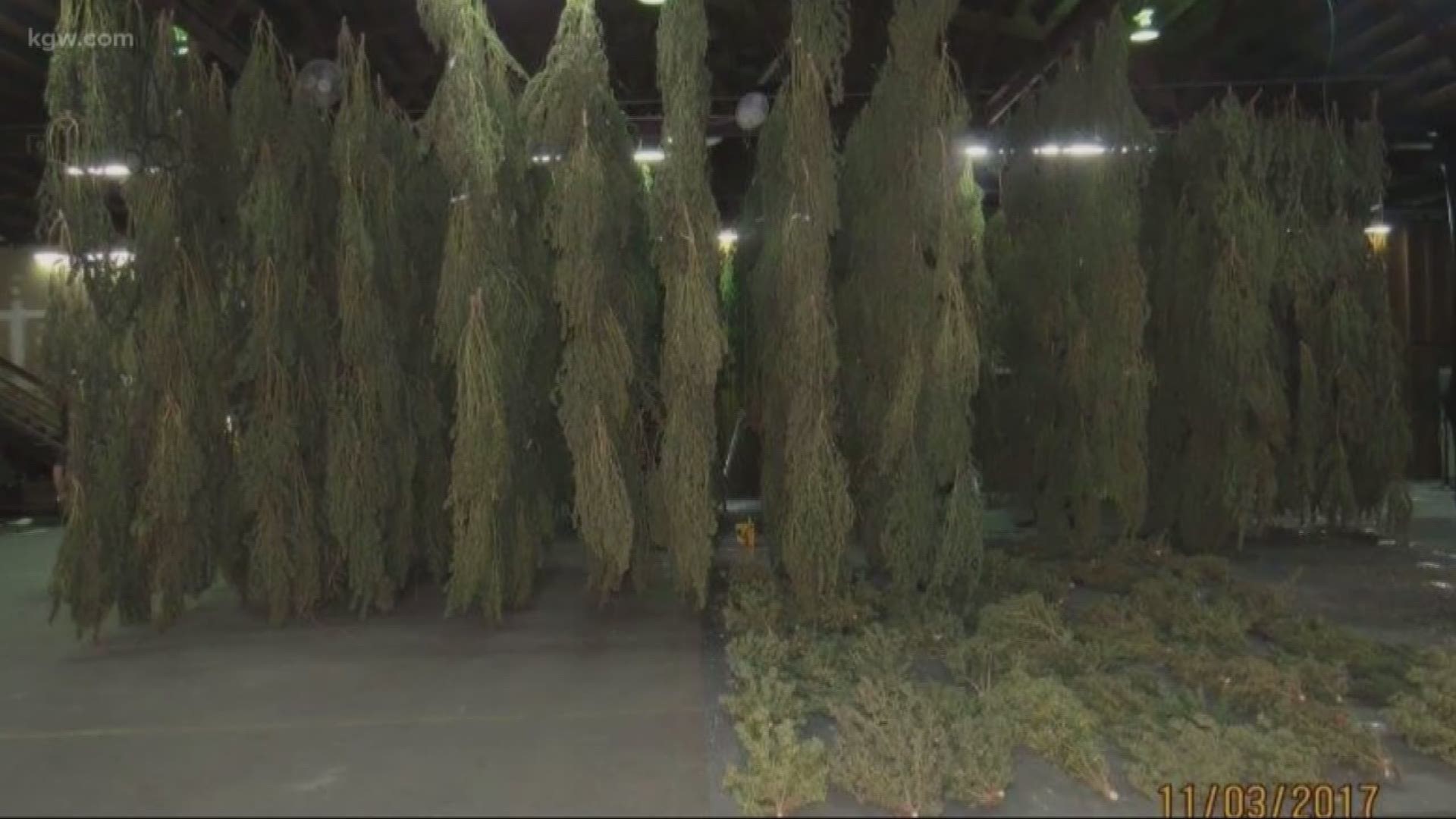PORTLAND, Ore. — Portland police acting on a tip discovered 16 people working in a marijuana-processing warehouse that investigators believe to be illegal.
Sgt. Chris Burley said Tuesday that documents provided to investigators showed the marijuana was being grown for several patients under the Oregon Medical Marijuana Program.
Burley says program guidelines would allow the operation to have up to 30 mature plants. Officers seized 500 plants weighing a total of 3,000 pounds.

The Multnomah County District Attorney's Office is reviewing the case for prosecution.
Travis Moffatt, who works near the warehouse, said he knew from the beginning that something wasn’t right when his neighbors moved in about a month ago.
“It didn't take the cops long to figure it out. Everybody around was kind of questioning it. When you're legal, you got cameras, you've got alarm systems, there's OLLC on site,” said Moffatt who also noticed workers seemed more active at night.
Police say the extra plants in illegal grows often end up in Oregon's thriving black market, something that's been a struggle to clamp down on.
“Enforcement around the marijuana program both medical and recreational is minimal in Oregon,” said Captain Mark Kruger with the Portland Police Bureau’s Drugs and Vice Division.
He said there simply isn’t enough personnel, there’s no time, and there aren’t any resources.
“We spend 99% of our time on heroin, meth, synthetic opioids, overdose death investigations. We dedicate almost no time to marijuana whatsoever. So the enforcement is not happening,” Kruger said. He said drugs like heroin or meth get priority over marijuana due to the opioid epidemic that’s hitting the community.
With pot being legal and more people growing it, Kruger said it's safe to say it’s likely more marijuana is making its way to the black market, creating an even bigger problem.
“Number one, you’re completely undermining the legitimate market in Oregon. You’re undermining all the legitimate businesses that have done all the right things and are paying their taxes,” said Kruger.
He said the black market also deprives the state of millions of dollars in tax revenue, and it also prevents the state from making good on its commitment to the federal government to keep marijuana within Oregon borders. He said in some cases legalization of pot has created a cover for the black market.
“It takes away from our sales plain and simple,” said Marie Marx, Green Gratitude’s Assistant Manager.
Marx said fewer people are coming in because they’re buying from people they know. She said the product is cheaper on the black market because people don’t need to pay the fees that dispensaries have to shell out.
She said sales this October, which is normally a busy month, are down. Marx thinks it's because more people are growing marijuana, now that it’s legal.
Both she and Kruger say they think more needs to be done to enforce the rules.
But some, like Moffatt have faith in the system.
“The fact they were here for less than a month and were raided showed the system is doing its job,” he said.
Kruger maintains there is a lack of enforcement and it’s due to an administrative problem.
“Because its legal in Oregon, it’s regulated by the state, it’s managed by the state, it’s an income producer for the state, the state needs to dedicate resources to make sure it’s functioning properly,” said Kruger.
Mark Pettinger with the Oregon Liquor Control Commission said there are three categories when it comes to marijuana in Oregon. There is the Oregon Medical Marijuana Program, overseen by the Oregon Health Authority. The OLCC oversees recreational marijuana licenses. Then there is illegal marijuana.
Pettinger said the OLCC can only intervene if someone has a license from the OLCC. Even so, he said the OLCC needs more resources to deal with the huge number of people with licenses.
He said that is why the Oregon Legislature allowed the OLCC to hire 40 people. Half of them will be dedicated to doing inspections in the field in the next few months.
According to Pettinger, next year medical marijuana growers must use the state’s Cannabis Tracking System if they plan to grow more than 13 plants. Pettinger said that will help cut down on abuse, if growers must enter information on their grows online where it will be monitored and scanned for anomalies.
Currently Pettinger said there are only two Oregon State Police detectives in the area dedicated to illegal marijuana operations. He said in the end, it’s up to the state to increase funding for enforcement.
In January of 2017, the Oregon State Police Drug Enforcement Section released a report detailing the extent of Oregon’s black market marijuana and where Oregon pot has been found both in the U.S. and outside the country.

